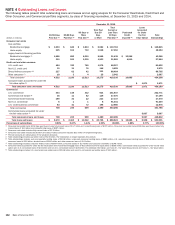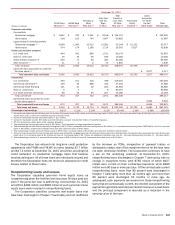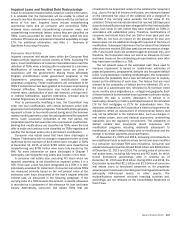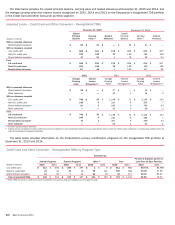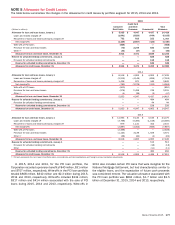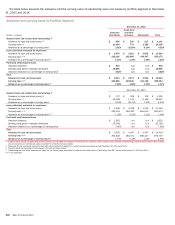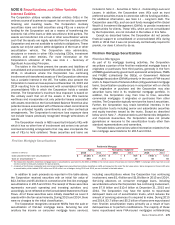Bank of America 2015 Annual Report Download - page 173
Download and view the complete annual report
Please find page 173 of the 2015 Bank of America annual report below. You can navigate through the pages in the report by either clicking on the pages listed below, or by using the keyword search tool below to find specific information within the annual report.
Bank of America 2015 171
The table below presents the carrying value of consumer real
estate loans that entered into payment default during 2015, 2014
and 2013 that were modified in a TDR during the 12 months
preceding payment default. A payment default for consumer real
estate TDRs is recognized when a borrower has missed three
monthly payments (not necessarily consecutively) since
modification. Payment defaults on a trial modification where the
borrower has not yet met the terms of the agreement are included
in the table below if the borrower is 90 days or more past due
three months after the offer to modify is made.
Consumer Real Estate – TDRs Entering Payment Default That Were Modified During the Preceding 12 Months
2015
(Dollars in millions)
Residential
Mortgage
Home
Equity
Total Carrying
Value (1)
Modifications under government programs $452 $ 5 $ 457
Modifications under proprietary programs 263 24 287
Loans discharged in Chapter 7 bankruptcy (2) 238 47 285
Trial modifications (3) 2,997 181 3,178
Total modifications $ 3,950 $ 257 $ 4,207
2014
Modifications under government programs $ 696 $ 4 $ 700
Modifications under proprietary programs 714 12 726
Loans discharged in Chapter 7 bankruptcy (2) 481 70 551
Trial modifications 2,231 56 2,287
Total modifications $ 4,122 $ 142 $ 4,264
2013
Modifications under government programs $ 454 $ 2 $ 456
Modifications under proprietary programs 1,117 4 1,121
Loans discharged in Chapter 7 bankruptcy (2) 964 30 994
Trial modifications 4,376 14 4,390
Total modifications $ 6,911 $ 50 $ 6,961
(1) Includes loans with a carrying value of $1.8 billion, $2.0 billion and $2.4 billion that entered into payment default during 2015, 2014 and 2013, respectively, but were no longer held by the Corporation
as of December 31, 2015, 2014 and 2013 due to sales and other dispositions.
(2) Includes loans discharged in Chapter 7 bankruptcy with no change in repayment terms that are classified as TDRs.
(3) Includes $1.7 billion of trial modification offers made in connection with the 2014 settlement with the U.S. Department of Justice to which the customer has not responded for 2015.
Credit Card and Other Consumer
Impaired loans within the Credit Card and Other Consumer portfolio
segment consist entirely of loans that have been modified in TDRs
(the renegotiated credit card and other consumer TDR portfolio,
collectively referred to as the renegotiated TDR portfolio). The
Corporation seeks to assist customers that are experiencing
financial difficulty by modifying loans while ensuring compliance
with federal, local and international laws and guidelines. Credit
card and other consumer loan modifications generally involve
reducing the interest rate on the account and placing the customer
on a fixed payment plan not exceeding 60 months, all of which are
considered TDRs. In addition, the accounts of non-U.S. credit card
customers who do not qualify for a fixed payment plan may have
their interest rates reduced, as required by certain local
jurisdictions. These modifications, which are also TDRs, tend to
experience higher payment default rates given that the borrowers
may lack the ability to repay even with the interest rate reduction.
In substantially all cases, the customer’s available line of credit
is canceled. The Corporation makes loan modifications directly
with borrowers for debt held only by the Corporation (internal
programs). Additionally, the Corporation makes loan modifications
for borrowers working with third-party renegotiation agencies that
provide solutions to customers’ entire unsecured debt structures
(external programs). The Corporation classifies other secured
consumer loans that have been discharged in Chapter 7
bankruptcy as TDRs which are written down to collateral value and
placed on nonaccrual status no later than the time of discharge.
For more information on the regulatory guidance on loans
discharged in Chapter 7 bankruptcy, see Nonperforming Loans and
Leases in this Note.
All credit card and substantially all other consumer loans that
have been modified in TDRs remain on accrual status until the
loan is either paid in full or charged off, which occurs no later than
the end of the month in which the loan becomes 180 days past
due or generally at 120 days past due for a loan that has been
placed on a fixed payment plan.
The allowance for impaired credit card and substantially all
other consumer loans is based on the present value of projected
cash flows, which incorporates the Corporation’s historical
payment default and loss experience on modified loans,
discounted using the portfolio’s average contractual interest rate,
excluding promotionally priced loans, in effect prior to
restructuring. Credit card and other consumer loans are included
in homogeneous pools which are collectively evaluated for
impairment. For these portfolios, loss forecast models are utilized
that consider a variety of factors including, but not limited to,
historical loss experience, delinquency status, economic trends
and credit scores.



